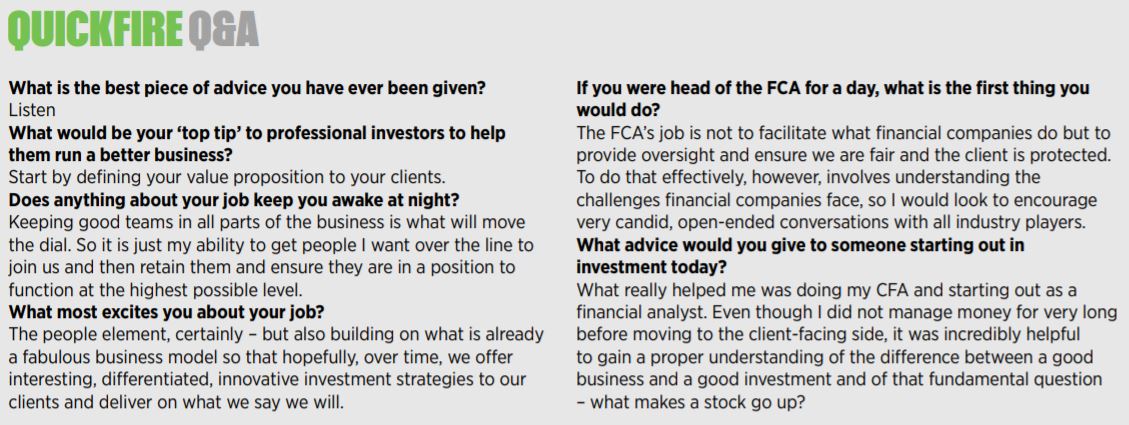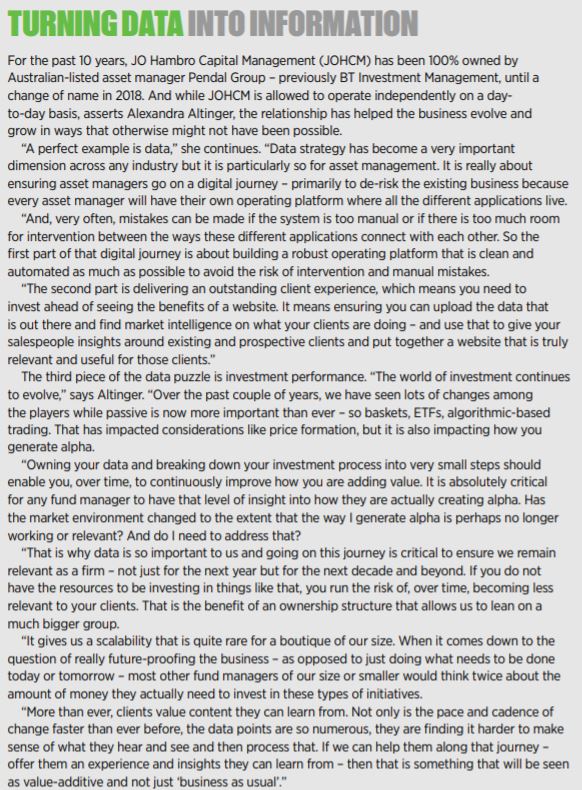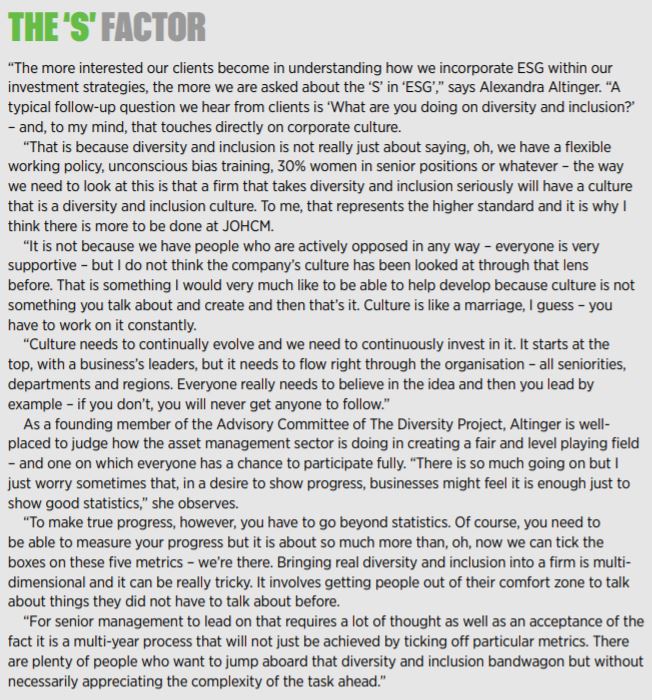What makes an asset manager a boutique – is it simply a matter of size or something more intangible like ‘state of mind’? It is meant as a serious question and Alexandra Altinger is kind enough to treat it as such.
“Probably both – though more state of mind than size,” she replies. “In my view, it is about daring to be different. Not necessarily disrupting but innovating because you can.”
It is actually Altinger (pictured), who joined JOHCM as chief executive officer, UK, Europe and Asia in September 2019 – the latest chapter in a near three-decade career that has included senior roles at multi-family office Sandaire, Lansdowne Partners International and Wellington Management International – who mentions the word first, when outlining what she believes sets the business apart from the crowd.
“Where JOHCM has done well has been as an investment-led asset management boutique,” she says. “We attract really good investment teams and give them a home where they are supported with regard to marketing, compliance, risk oversight and, increasingly, data and technology – but where they are still given enough freedom to express their talent and thereby generate returns.
“This is clearly the boutique space – we will never be a fund supermarket or a giant asset manager like, say, a Blackrock or a Wellington – and we do not aspire to be that. What we do want, however, is to ensure we continue attracting idiosyncratic, differentiated, high-conviction investment teams and then give them a platform to express their talent, which hopefully translates into alpha.”
Altinger acknowledges this model means the firm has to think harder about scalability. “Many of our strategies cannot be scaled beyond a certain level and, frankly, we only have one strategy that can go beyond $10bn,” she says. “Most of the others are capped and we have been very rigorous in terms of how we manage capacity – unlike some of our competitors in the small and mid-cap space.
“It is an interesting model in the sense that, because we cannot just scale what we have instantly, part of our growth will need to come from extending our product offering and attracting other investment teams.”
Later this year, for example, JOHCM plans to launch a global equities sustainable water and waste investment strategy for Bertrand Lecourt and Saurabh Sharma, who recently came on board from Fidelity International.
Thematic strategies
Altinger mentions the firm is also looking at launching other thematic strategies, so is this JOHCM acknowledging that investors – and, by association advisers and asset managers – now need to be thinking beyond traditional equity and bond funds?
“The short answer is yes – while accepting that equities and bonds are a huge part of what an investor’s core exposure would need to be,” she replies.
“Where we need to do a lot more work though, is around understanding how all of this fits together. That means thinking about equities and bonds – not so much as separate asset classes but, together, what sort of solutions are we providing? And what role does a particular combination need to play within the broader context of a client’s needs?
“Equities are only relevant to asset managers to the extent they fulfil a certain need for a client – and the same goes for bonds. When you put the two together, that gives you a very different risk-return profile and, again, that will fulfil a very different client need. That then begs the question – what else do you need to think about that you might want to add into the mix?
“Take the SFDR – the European Union’s new ‘Sustainable Finance Disclosure Regulation’ taxonomy – which is primarily looking to provide definitions around ESG and identify if fund managers are applying an intentional ESG framework to the way they invest. A lot of clients are now trying to get their heads around how much that needs to be part of how they view their investments, so this is another dimension that has to be considered.
“There is also the extent to which elements of thematic investing could be driven by the UN’s Sustainable Development Goals. There is room for that thematic type of exposure within people’s portfolios beyond regional or global equities or bonds simply because it opens up a very different part of the investment universe – one that moves in very different ways and with a different time horizon as well.”

Words into action
The asset management sector is becoming very accomplished at talking about ESG but how does Altinger think businesses can best go about turning reassuring words into meaningful actions?
“That is literally easier said than done,” she replies. “For our part, however, about a year ago – just after I joined JOHCM – we took the decision to look very closely at every single one of our investment strategies.
“We wanted to identify where our fund managers had already been on that ESG journey – and perhaps either not articulated it effectively or not really known how to position that. And for other fund managers, who wanted to go on that journey, we wanted to know where they have struggled because they felt they did not have the right inputs or tools or even the right resources from the business to support them.
“As you might expect, given each of our management teams is so independent and so dierent in how they view the world, how they invest and how we describe them, we found we had the whole spectrum. Some were really quite developed – they were already specialists, with ESG scorecards, dedicated ESG analysts embedded within the teams and so on – while others were very keen to start but had not really done so yet.
“My job here is to respect the teams’ independence while offering appropriate centralised support – to say, if it is helpful, this is what we can give you in terms of tools, data, individuals and other help for your ESG journey. In doing so, we have been able to leverage offthe deep domain expertise of our affiliate Regnan – an advisory and engagement business based in Australia, which is seen as one of the most credible players in this space.
“It has been a big project for the business but, in the end, what we have found is that eight of our 11 funds already qualify as ‘Article 8’ under the SFDR taxonomy – that is, they are sustainable and responsible in the way they go about choosing stocks – and some are actually candidates to qualify as ‘Article 9’, which would be the highest level of sustainable investing.”

And how would Altinger say JOHCM is doing with regard to the other side of the ESG coin – practising what it preaches?
“Of course, the investment teams for the various funds we oer need to engage with ESG and, of course, we need to be able to talk about this and point to evidence and examples of where we have moved the dial,” she replies. “But it is not enough just to do it within our portfolios.
“We need to be making statements around what we believe is important – and why. Our stewardship code, which we have just completed, is a good start but it is only a start. We have not done a good enough job of articulating corporate statements around the sustainable development goals we support, for example, and we are not yet part of the Net Zero Asset Managers initiative. As a business, there is a lot more we need to do.”
Surprisingly pragmatic
Given her experience working in asset management in Europe, Asia and the US, does Altinger believe the UK’s Financial Conduct Authority (FCA) achieves an appropriate balance between protecting consumers and allowing businesses to do the best job they can?
“On the positive side, I do think the FCA is surprisingly pragmatic in the way it engages with the various players in the industry,” she begins.
“Financial regulation in this country is principles-based but it will often then allow companies some degree of latitude to interpret those principles or rules in a way that is right for the business. That is not the case on the continent or globally, which is a huge advantage for the FCA. Has it got the balance right, though? I think most asset managers would still feel regulation is very heavy in terms of the standards we all need to meet.
“To be clear – I think the intention is spot-on. It is just the way things can sometimes be interpreted, and what that can mean for an asset management firm today, is not always optimal. It does feel like there is a lot there – but, again, the UK is one of the marketplaces where the regulator does reach out, in a very open-ended sort of way, just to have a dialogue with different firms and I do welcome that.
“As a CEO, it has been really reassuring to see the interest the FCA takes in understanding different business models and that it does not necessarily come at things from a ‘cookie-cutter’ approach, where one size must fit all.
“That whole concept of proportionality is not something you see in every marketplace and is a good example of where the FCA has got the balance right.”
Value for money has, of course, become a particular focus for the regulator and JOHCM has recently completed the latest round of assessment of value reports on its fund range.
“This is now the second year we have had to do this and it has been a massive project for us,” says Altinger. “Value is all about ensuring the price a client pays us is commensurate with the service we are providing and there are several parts to that.
“One part is simply the costs inherent in allowing the client to invest in a fund – operating expenses, custodian expenses, admin expenses, legal expenses and so on. All of that needs to be proportionate and reasonable and, as we become bigger, some of those expenses will become smaller as a percentage of the fund, which is obviously something we feed straight through to our clients.
“At the same time, however, performance is critical. Clients will typically buy our funds because they expect a certain return over a certain cycle and that is what we need to get right. So we need to achieve this balance between ensuring we allow our clients to enjoy the benefits of scalability, wherever possible, but never going beyond a point where all of a sudden we end up diluting our alpha proposition.”











